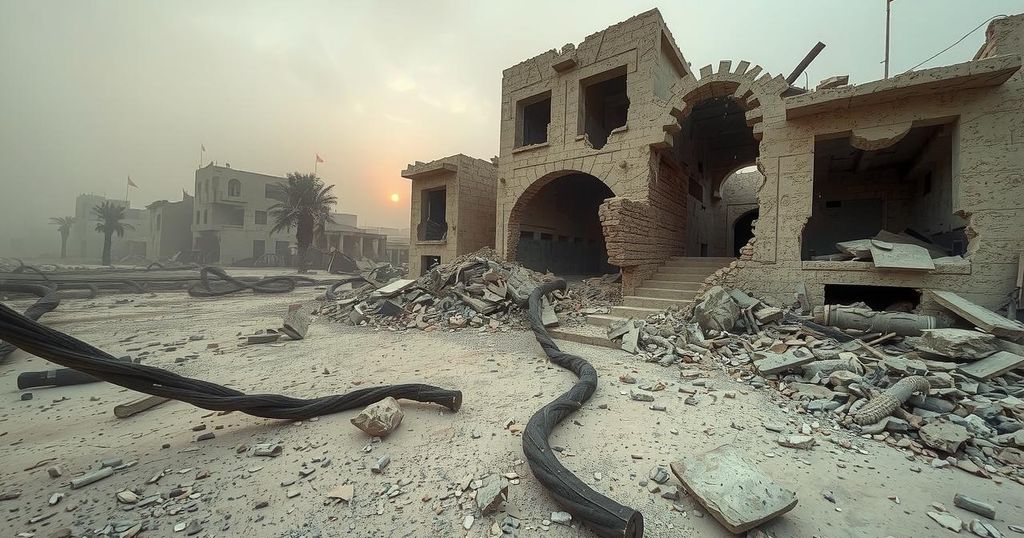U.S.-led ceasefire talks involving Russia and Ukraine are taking place in Saudi Arabia, with hopes for a truce by Easter. Focused on a potential 30-day ceasefire and broader peace discussions, these talks are complicated by ongoing military actions and territorial claims. Key issues include the future of Black Sea shipping, Ukraine’s NATO aspirations, and U.S. interests in Ukraine’s resources. High hopes clash with skepticism from the Kremlin, suggesting the negotiations may face significant hurdles ahead.
Recent ceasefire talks between Ukrainian and Russian officials are taking place in Saudi Arabia, where U.S. President Donald Trump is advocating for a truce by Easter. These discussions mark a significant occasion, being the first parallel peace talks since Putin’s full-scale invasion. While optimism for a swift resolution exists, Kremlin spokesperson Dmitry Peskov warned against such expectations, labeling the negotiations as merely the start of challenging discussions.
The primary focus of the ongoing talks is a proposed 30-day ceasefire concerning attacks on energy infrastructure, aiming for stability amidst ongoing hostilities. The discussions follow an agreement reached between Mr. Trump and Mr. Putin on a pause in military assaults on energy facilities. However, doubts about the ceasefire’s feasibility have arisen due to ongoing strikes by Moscow, undermining the proposed agreement. Nonetheless, President Zelensky indicated Ukraine’s willingness to draft a list of facilities subject to a partial ceasefire.
Key topics during these discussions are expected to include a potential revival of the UN-brokered Black Sea shipping deal, which aims to facilitate safe navigation for commercial vessels. Putin has expressed a positive response to U.S. initiatives in this regard; however, attention remains on whether tangible progress will be made regarding shipping and broader ceasefire terms. The ongoing conflict continues to raise concerns about security and maritime safety in the region.
Another significant issue lies in Russian territorial claims over parts of Ukraine. U.S. Special Envoy Steve Witkoff indicated that a crucial point in the negotiations is Zelensky’s acknowledgment of Moscow’s claims to several Ukrainian regions, previously sought after by Russia. Ukrainian officials remain firm in their stance against recognizing Russian sovereignty, while the U.S. questions the implications of accepting a peace deal that would allow Russia to maintain control over Ukrainian lands.
Discussions will also address Ukraine’s NATO membership and the future of military security guarantees. Although there is speculation about potentially conceding territory in exchange for security assurances from NATO, the Trump administration has expressed skepticism about NATO’s appetite to include Ukraine. Broader cooperation between Western nations regarding military assistance is also being considered to bolster Ukraine’s security.
The U.S. administration is exploring the possibility of a stake in Ukraine’s mineral and energy resources as a way to deter future Russian aggression. After prior setbacks, discussions about securing U.S. interests in Ukraine’s substantial rare earth minerals remain ongoing. Additionally, involvement in managing Ukraine’s energy infrastructure, including gas facilities and nuclear power plants, is under consideration to help in diversifying energy supplies for Europe.
Recently, both Russia and Ukraine executed a significant exchange of prisoners, with 175 individuals being swapped, reflecting ongoing diplomatic efforts amidst the conflict. Moreover, discussions regarding the easing of Western sanctions on Russia and the potential for holding Ukrainian elections amidst martial law are also on the agenda. During wartime, Kyiv officials assert that conducting elections would be impractical due to ongoing hostilities. The current discussions thus mark a complex blend of diplomacy, military strategy, and humanitarian considerations in pursuit of a resolution to the ongoing conflict.
The ceasefire discussions in Saudi Arabia represent a pivotal moment in the protracted conflict between Ukraine and Russia. With both sides seeking to navigate a plethora of complex issues, including territorial disputes, energy security, and military alliances, the upcoming dialogues will likely determine the future course of the region. While optimism exists for a notable reprieve, significant challenges remain, as emphasized by the Kremlin’s cautious stance and ongoing military actions. Thus, the outcome of these negotiations will be critical in shaping the geopolitical landscape moving forward.
Original Source: www.independent.co.uk




